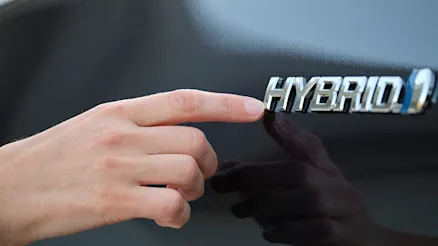
Why hybrids are quietly winning Australia’s EV race
Hybrid vehicles in Australia are currently more popular than full battery EVs. The difference comes down to factors like pricing, variety and range.
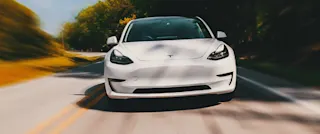
Electric cars have got us all talking, and they’re definitely not a passing fad either. The NSW Electric Vehicle Strategy that sets out to increase EV sales to 52% by 2030–31 and achieve net-zero emissions by 2050 means they’re here to stay. So if you’re one of the many drivers across the world seeing the sustainability impact, lower maintenance and running costs, and asking ‘Should I buy an electric car?’ We’ve got a guide to everything you need to know about buying and owning used electric cars for you.
Electric cars are changing our roads and how we live for the better. What’s more exciting is that there’s even more to come with new models, tax incentives, and charging network developments.
Let’s start with the fun part – what’s available to buy in the Australian EV market today. While Tesla cars are currently leading the EV market by far, there are plenty of electric cars worth more than just a look. As an EV buyer in Australia, you have more than 60 models to explore, from electric SUVs and performance cars, to electric vans and utes. You can also choose to go with a plug-in hybrid (PHEV) if you don’t want to go full pure EV. At Carma, we’ve had 244 used electric cars for sale in the last 12 months alone. These options will only continue to expand as many more EVs make their ways to our shores. What’s currently available and coming soon only signals towards a future where EVs replace traditional petrol and diesel cars. Manufacturers are making updates across their cars, addressing concerns like battery range, price points, and design.
On what’s offered today in the EV space, our Director of Buying Peter Willis has a few thoughts: “Newer, flashier manufacturers like Tesla make electric cars that feel futuristic and offer a unique driving experience,” he says, “Meanwhile, we’re also seeing developments from established brands like Hyundai and BMW taking a lot of their experience in internal combustion engine cars into making electric passenger cars that appeal to consumers that they already cater to.”
With that said, features like regenerative braking, front boots, and silent take-offs will always be things that are unique to the EV experience. What that all means is, as the EV market continues to expand, it will get you more and more great used EV options to choose from.
Another thing that makes switching to EVs so enticing are the tax reforms and incentives that make it cheaper and easier to buy and own an EV in NSW. Stamp duty refunds, electric vehicle rebates, and funding towards vehicle electrification helps many buyers overcome the steep upfront costs. $3,000 rebates are offered on eligible new EV purchases with a dutiable value up to $68,750, and 6,203 of the 25,000 rebates have already been paid out as of 31st March 2023. These incentives get you a lot closer to enjoying lower maintenance and servicing costs, low emissions, and advanced tech in your daily life.
Along with tax incentives towards EV ownership, another part of the government’s efforts is growing the charging network across the country. Commuter EV charging, kerbside parking, destination charging, and fast charging infrastructure are all in development with government funding and a partnership with NRMA. With a widespread charging network, concerns like range anxiety will effectively be a thing of the past. EV drivers can be confident to drive their cars whenever and wherever they need to go.
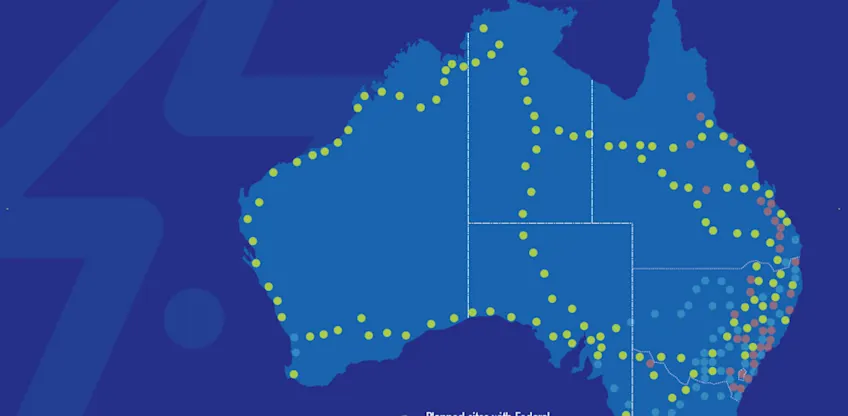
Buying a used EV can be a little different from buying a used petrol or diesel car. Here’s a few key things to consider.
There are two main things to look out for on the mechanical side of buying a used electric car. First is the battery. As explained by our Director of Vehicle Operations Hugo Acosta, the battery on an EV is essentially its fuel tank, but the lithium-ion cells can degrade over time. “Most EVs have a battery monitor that displays the state of battery health,” he says, “You can also ask the owner or dealership about the car’s charging and driving behaviour history.”
Battery size can also determine the driving range of the car, and this varies across different models. Manufacturers will often provide an estimated driving range on their cars, but your driving conditions, temperature, and driving habits can affect that in the same way fuel consumption works on internal combustion engines. On battery range, Hugo offers this advice: “Considering your daily driving habits and where you’re driving to can help determine how much range you need.”
Next, check whether the tires are within wear range. “Electric car tires tend to wear around 20% faster than petrol and diesel cars, as regenerative braking creates more friction on the tires.” says Hugo, “While the brakes can last up to twice as long, regenerative braking places immediate pressure on the car’s tires.” EV tires are typically designed with better grip to deal with this, but tire wear and tear in general should be something on your checklist when buying a used EV.
One significant change to your driving habits when you get an electric car is that you’ll likely never have to get in line at the service station ever again. This lifestyle change is also why drivers should be thinking about how they'll be charging your EV before buying one.
There are many charging options, from home chargers, charging at shopping centres or at work, and even more options as infrastructure continues to expand. “When you buy a used EV, think ahead about where you can charge,” Peter says, “you should also check that your used EV comes with the right charging accessories.”
As an EV owner, you’ll also need to make sure your car has the right EV label on its registration plate. These stickers differ by state, and they help first responders attending to a crash to identify cars with battery packs that need to be disabled or removed. All electric cars including hydrogen-powered, pure electric, and hybrid cars will require this label on front and rear number plates. Not to worry though, the labels should already be fixed if you’re buying from a dealership.
With all these things in mind, we think you’ll definitely be closer to answering the big question of ‘Is an EV for me?’. In the same way as buying any used car, there’s a few things to consider with a used EV, so you’ll be well-equipped by doing enough research.

Hybrid vehicles in Australia are currently more popular than full battery EVs. The difference comes down to factors like pricing, variety and range.
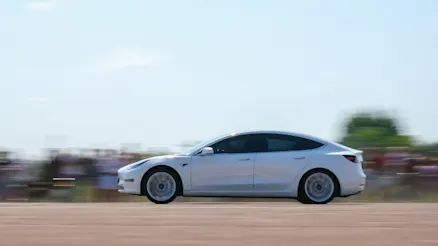
The Australian Government has confirmed an EV road user tax will apply in the future. So is this a good idea or an unfair one? Let’s get stuck in.
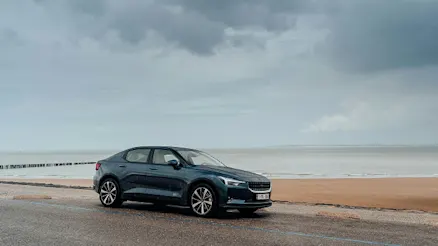
Are EVs losing popularity in Australia? As we explore, there’s still plenty of interest in electric technology but the issue is multifaceted.